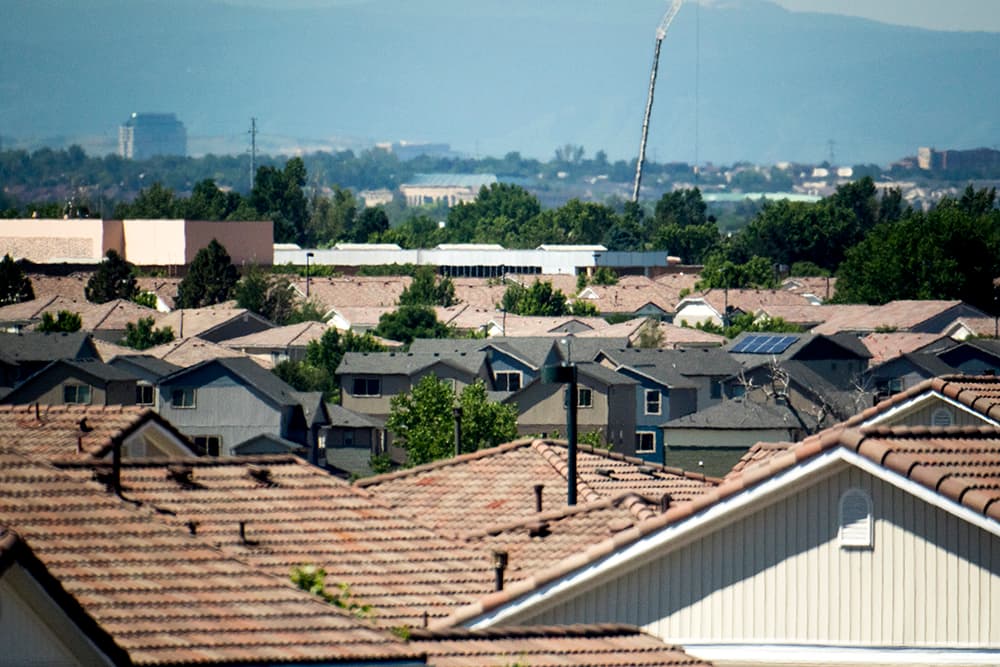The affordable housing mess that affected hundreds of homes in Denver is not over yet.
Earlier this year, the city said 306 properties — out of about 1,402 homes covered by the program — mostly in northeast Denver had been flagged for having potential violations of the rules of the affordable homeownership program.
Basically, people who didn't qualify for or hadn't gone through the process to own below-market homes in Denver's program ended up owning them.
Some of them apparently had no idea they owned houses they weren't supposed to own and some did. On Wednesday, chief housing officer at Denver’s Office of Economic Development Britta Fisher said 105 have so far been cleared and brought into compliance over the past three months. That leaves 201 remaining homes with issues, which the city is hoping can be brought into compliance with a new ordinance.
Fisher said the changes help preserve the affordability of the affected homes and give homeowners an option to stay in their homes. The proposed changes would be made to the city’s inclusionary ordinance, while there will be additional revisions to the ordinance's rules and regulations.
“Given the incredible demand for affordable housing, it’s paramount for us to treasure and protect all of our affordable homes,” Fisher said. “This is also fair to the majority of the homeowners who have properly followed the ownership requirements by not allowing a windfall to households not following the requirements.”
Some property owners will be forced to sell their properties. City attorney Kristin Bronson said there will a cap on the sale prices; OED spokesperson Derek Woodbury said in an email that price will be determined based on existing covenant restrictions (each one is different). At least 42 of the 306 properties' homeowners bought the properties at market-rate.
The proposed new ordinance adds an option for the remaining out-of-compliance homeowners.
Under current ordinances, city attorney Kristin Bronson said there are limited legal options available to the city.
It would provide homeowners an option of temporarily timing-out or suspending the affordability requirement, with the suspension period spanning from when the property fell out of compliance to when the owner sells the property, Fisher said.
Officials have previously said the properties have “covenant restrictions,” which are legally binding documents that outline what can and cannot be done in each property.
"If we had a covenant of 10 years, and there were two years of non-compliance, when the current owner goes to sell, we would tack another two years on to the end of the covenant, to the remaining covenant," Bronson said, discussing a hypothetical. "So if fall out of compliance in year 5, then there will be seven years of additional covenant restrictions following the sale."

“We think this option is a compassionate option to help those who find themselves in a tough situation," Fisher added.
The new ordinance would be available to non-income qualified owners, Fisher said, and participation will be voluntary, Bronson added.
The proposed ordinance could potentially be available to other homes outside the original 306 that had been found out of compliance (the city anticipates potentially finding new compliance issues). It will only be open to people who acted in good faith, Fisher said, and for people who were found to be out of compliance between Oct. 1, 2017, to Dec. 31, 2018.
"If there's evidence that they purchased this property knowing it was an affordable unit and they're non-complaint, that's not going to be someone we would consider for this program," Bronson said.
Some of the 105 fixes were relatively easy.
They included quick-fixes like getting some owners income-eligible or fixing deed transfers that weren't allowed. However, Bronson said there were some homeowners who haven’t yet responded to the city. Residents were sent notices informing them of the potential violations.
As anticipated, the city uncovered some situations where people were taking advantage of the housing program. It could lead to a notice of violations, which Bronson said could include enforcement action, and to the city attempting to recoup profits the homeowners made from the property.
These situations includes rentals where Bronson said homes that are supposed to be affordable units are being rented for profit for short-term or long-term basis. Fisher said 57 properties were being rented out (there are some rental options available under the current affordable housing rules that didn't qualify as bad-faith actions).
“Sometimes, the homeowner resides in the state,” Bronson said. “But we’ve found instances where homeowners have been out-of-state or even living out of the country and profiting off the affordable home.”
The city says it's taking steps to prevent this from happening again.
Bronson said the city has been meeting with regulators and industry groups and advocating for changes in the real-estate regulations and forms to help avoid a similar situation in the future.
“We’ve been working directly with the title industry, as well as real estate brokerage industry, current municipal league and other partners, and have made several presentations now the Colorado Real Estate Commission to try and change the forms to include the affordable housing program in the listing agreement, the contract to buy/sell, as well as the seller disclosure form,” Bronson said.
Those communities have been supportive, Bronson said. There are efforts to provide additional training to the OED’s staff.
Bronson said they're "pushing" the title industry to make changes to their title policies, but that those efforts have been unsuccessful. The city wants title policies to include details showing the properties are part of the city's affordable housing program. Bronson said she's aware of some lawsuits filed against title companies related to this affordable housing issues, but none have so far been filed against the City of Denver.
Another big step: Bronson said OED’s housing compliance team was “drastically” expanded. They’ve increased the housing compliance team from one to seven, which she said helps with prevention efforts.
“We are also working on better coordination with the Denver clerk and recorder, as well, and the assessor's office, trying to improve our internal coordination and notification between the departments,” Bronson said.

What’s next?
The ordinance proposed by Fisher’s office will be brought to the Denver City Council’s Safety, Housing, Education and Homelessness Committee for discussion on Sept. 12. Once it gets the OK at the committee level, it will be forwarded to full council for consideration and potential approval. Bronson said this means the law could be adopted by the city as soon as Oct. 1.
Changes made to the program’s rules and regulations will also require a revision process that will include a public hearing.












